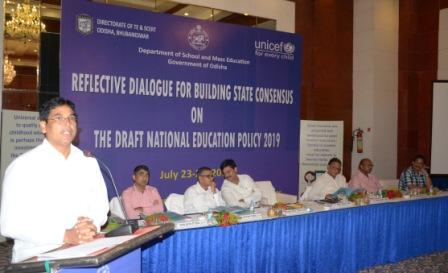Bhubaneswar: The School and Mass Education department and Unicef jointly organised a workshop here, Tuesday, on the National Education Policy-2019. It was aimed at having a reflective dialogue for building a consensus on the draft policy.
On the occasion, School and Mass Education Minister Samir Ranjan Das said the education policy must help in achieving the goals and secure the future of students.
Higher Education Minister Arun Kumar Sahoo said overall growth of students, including physical and mental skills, is necessary.
The committee for Draft National Education Policy 2019 chaired by K Kasturirangan submitted its report December 15, 2018 for debate and discussion.
The report proposes an education policy which seeks to address the challenges of access, equality, quality, affordability, accountability faced by the current education system. The policy also deals with early childhood care and current structure of school education.
Civil society leaders have welcomed the long-awaited shift in the education sector as mooted in the draft. However, they said, there are some inclusions which need to be reconsidered before the draft policy is finalised.
Naba Kishor Pujari, an educationist, said, “We welcome the policy as it talks about inclusion of both early childhood education and secondary education under Right to Education (RTE) Act, doubling the budgetary allocation for education, strengthening decentralised mechanisms of teacher management and support and a possible comeback of the no-detention policy which was scrapped by the BJP-led NDA government.”
Noopur of National Coalition for Education, New Delhi, said that the positive aspects of the policy are its focus on childhood care and education and its recommendation of extending the ambit of the RTE Act to include early childhood education.
This would extend the coverage of the Act to all the children between the ages of three and 18 years, she said. Also, the recommendation of reducing the curriculum load in each subject to its essential core content is also a welcome step. The current structure of school curriculum solely focuses on rote learning.
The new system would make space for holistic, discussion-based and analysis-based learning, Noopur said, adding the regularisation of all teachers and no detention policy rule is appreciable. The draft policy has recommended the setting up of National Research Foundation for funding, mentoring and building the capacity for quality research in India.
Earlier, the OSSTA (Odisha Secondary School Teachers’ Association) has called for more time to extensively debate the issue.
